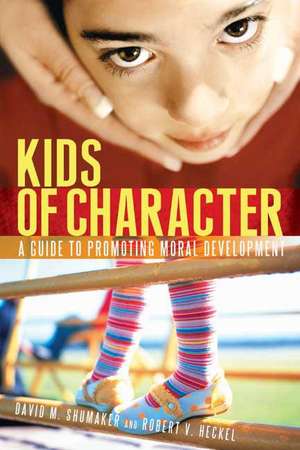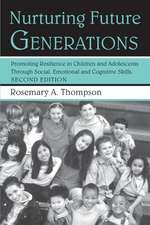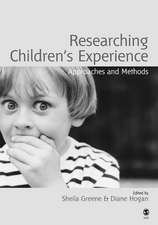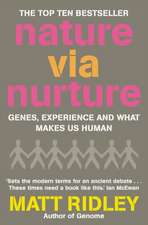Kids of Character: A Guide to Promoting Moral Development
Autor Robert V. Heckel, David M. Shumakeren Limba Engleză Hardback – 29 mar 2007 – vârsta până la 17 ani
Preț: 355.24 lei
Preț vechi: 414.81 lei
-14% Nou
Puncte Express: 533
Preț estimativ în valută:
67.99€ • 70.44$ • 56.74£
67.99€ • 70.44$ • 56.74£
Carte tipărită la comandă
Livrare economică 21 martie-04 aprilie
Preluare comenzi: 021 569.72.76
Specificații
ISBN-13: 9780275988890
ISBN-10: 0275988899
Pagini: 224
Dimensiuni: 156 x 235 x 23 mm
Greutate: 0.49 kg
Editura: Bloomsbury Publishing
Colecția Praeger
Locul publicării:New York, United States
ISBN-10: 0275988899
Pagini: 224
Dimensiuni: 156 x 235 x 23 mm
Greutate: 0.49 kg
Editura: Bloomsbury Publishing
Colecția Praeger
Locul publicării:New York, United States
Notă biografică
David M. Shumaker is an Instructor at the Massachusetts General Hospital Department of Psychiatry, Children and the Law Program. He is also an Adjunct Professor at Suffolk University, and has been a Lecturer at Harvard University Medical School. Dr. Shumaker maintains an active private practice on Boston's South Shore. He has worked in settings including a juvenile detention facility, a jail, a juvenile court clinic, a large alternative school, and a community-based mental health center, as well as a university-based clinic. Shumaker co-authored Children Who Murder: A Psychological Perspective (Praeger, 2001).Robert V. Heckel is Distinguished Professor Emeritus in Psychology at the University of South Carolina. Across nearly 50 years, he worked as Director of the Social Problems Research Institute and Professor at Furman University and the University of South Carolina, as Director of Graduate Training in Clinical Psychology, in private practice, a community clinic, a medical school and a veterans hospital. He has published 29 books and monographs and more than 200 papers. Dr. Heckel co-authored Children Who Murder: A Psychological Perspective (Praeger, 2001).
Recenzii
Most guides simply list things to do without providing much of a rationale for the advice they give. The author often seems to be simply talking off the top of his or her head, imparting folk wisdom. The present volume is a pleasant exception. Shumaker and Heckel provide an accurate summary of the research on this subject to this point in time and support many of their contentions with brief histories. The summaries are not only complete but also written with a minimum of professional jargon, extending the book's audience to laypeople. This said, professionals reading this book will nod with approval because the authors articulate what psychologists and child specialists have been saying for years. An especially appealing feature is the separate chapters on the various influences on the moral development of children, e.g., family, peers, community, schools, religion, sport, and play. This is a book for anyone planning a career that will involve children or for the parent intent on raising a moral child. Highly recommended. All readers; all levels.
Kids of Character represents a laudable effort to provide readers with useful information and insights on the moral development process. It is clear that the authors are very knowledgeable and passionate about the interests of young people, and their work has the potential to redirect focus toward the import of children and character education. If it succeeds at accomplishing nothing beyond this, then it will still have been a valuable project. I recommend it as a worthy addition to any parent's resource library.
[T]he process of developing morality in children often seems difficult and unclear in an increasingly technologically modern period. Kids of Character: A Guide to Promoting Moral Development provides an empirically informed summary of the recent findings regarding children's moral reasoning capabilities and important influences on moral development..[t]he book presents several compelling points that make it an easy, informative, and enjoyable read..Particularly appealing is Shumaker and Heckel's attempt to empower parents and other adults to seek out and implement an appropriate strategy to promote the development of character..Shumaker and Heckel do not stop at just reviewing and discussing moral development, they also provide practical recommendations and solutions.
Shumaker and Heckel describe promoting moral development in children. The influence of changes to today's family, as well as peers are key, they say, and they enumerate the role of the community, schools, and religion. They also discuss how sport fails character development.
Kids of Character represents a laudable effort to provide readers with useful information and insights on the moral development process. It is clear that the authors are very knowledgeable and passionate about the interests of young people, and their work has the potential to redirect focus toward the import of children and character education. If it succeeds at accomplishing nothing beyond this, then it will still have been a valuable project. I recommend it as a worthy addition to any parent's resource library.
[T]he process of developing morality in children often seems difficult and unclear in an increasingly technologically modern period. Kids of Character: A Guide to Promoting Moral Development provides an empirically informed summary of the recent findings regarding children's moral reasoning capabilities and important influences on moral development..[t]he book presents several compelling points that make it an easy, informative, and enjoyable read..Particularly appealing is Shumaker and Heckel's attempt to empower parents and other adults to seek out and implement an appropriate strategy to promote the development of character..Shumaker and Heckel do not stop at just reviewing and discussing moral development, they also provide practical recommendations and solutions.
Shumaker and Heckel describe promoting moral development in children. The influence of changes to today's family, as well as peers are key, they say, and they enumerate the role of the community, schools, and religion. They also discuss how sport fails character development.














